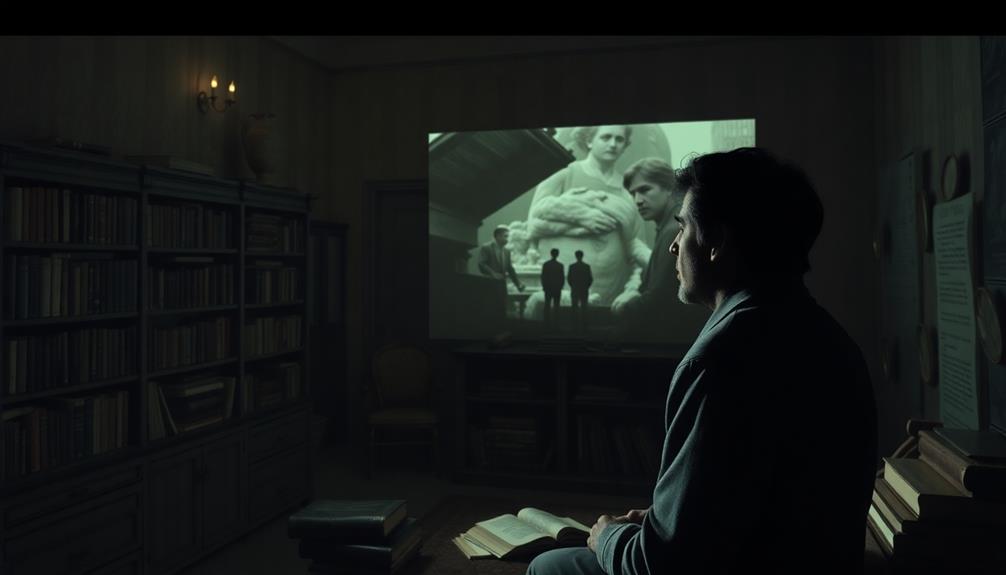Exploring philosophy through a curious lens invites you to examine life's complexities and moral dilemmas. This journey sharpens your critical thinking and enriches your understanding of ethics in everyday decision-making. Popular culture, like films and literature, presents engaging narratives that challenge your perceptions and provoke deep questions about existence, identity, and morality. You'll find that philosophical inquiry also enhances self-reflection, revealing your beliefs and values. By questioning assumptions and analyzing ethical frameworks, you can unravel the intricacies of topics like euthanasia or digital relationships. There's so much more waiting for you to uncover and explore.
Key Takeaways
- Philosophy encourages curiosity by challenging assumptions and prompting deeper inquiries into moral and ethical dilemmas in everyday life.
- Engaging with narratives in popular culture, such as films and books, provides relatable contexts for exploring philosophical concepts.
- Self-reflection through philosophical inquiry enhances personal understanding and awareness of beliefs and values guiding actions.
- Analyzing contemporary issues, like euthanasia and digital relationships, showcases the relevance of philosophy in addressing modern ethical challenges.
- Exploring various ethical frameworks, such as utilitarianism and Kantian ethics, fosters a nuanced understanding of complex moral questions.
Philosophy in Daily Life

Philosophy isn't just for academics; it's a practical tool you can use in your daily life. You might think you know philosophy as just abstract ideas, but it offers valuable frameworks for tackling ethical dilemmas and decision-making challenges you face every day. By engaging with philosophical concepts, you can develop critical thinking skills that help you navigate complex situations more effectively.
Consider the moral questions presented in movies and literature. These narratives aren't just entertainment; they invite you to reflect on your values and beliefs. When you analyze characters' choices, you sharpen your ability to assess your own actions and their consequences. Historical context enriches your understanding of contemporary issues, making philosophy relevant in today's world.
Moreover, philosophical inquiry encourages self-reflection. As you grapple with what you believe and why, you deepen your understanding of yourself and the world around you. Instead of viewing philosophy as distant or irrelevant, embrace it as a guide for your daily life.
Popular Culture as a Tool

Movies, books, and TV shows serve as powerful lenses through which we can explore philosophical ideas. Engaging with popular culture allows you to encounter complex themes in a relatable way.
For instance, in the domain of technology, stories reflecting on AI privacy issues can provoke questions about morality, identity, and the human condition, inviting you to reflect on your own beliefs and values. Characters and narratives provoke questions about morality, identity, and the human condition, inviting you to reflect on your own beliefs and values.
For instance, films like "The Matrix" and "Inception" challenge your understanding of reality and perception, sparking discussions about existentialism and consciousness.
Television series such as "The Good Place" introduce ethical dilemmas, presenting moral philosophy in an entertaining format that's easy to digest. These stories don't just entertain; they encourage you to think critically about your choices and the principles that guide them.
Moral Complexity in Assassination

Maneuvering the moral complexities of assassination reveals a tangled web of ethics and justification.
Take the character of James Bond, for instance. He embodies the licensed assassin, operating under the premise that his killings serve national security and the greater good. This raises critical questions about the morality of such actions. Philosophers often reference utilitarianism, which evaluates the morality of an act based on its outcomes. You might wonder, does the end truly justify the means when lives are at stake?
On the flip side, Kantian ethics vehemently opposes assassination, arguing that killing violates the intrinsic moral worth of individuals, no matter the circumstance.
This dichotomy prompts you to reflect on historical examples, like the assassination of Osama bin Laden, which ignites heated debates over legality and morality in state-sanctioned killings.
Friendship Redefined Online

As you navigate the vast world of social media, it's essential to reflect on how Aristotle's framework of friendship applies to your online interactions.
Are those digital connections providing genuine support, or are they just numbers on a screen?
Exploring the value of online relationships can help you understand their role alongside face-to-face friendships.
Aristotle's Friendship Framework
In the digital age, it's crucial to unpack Aristotle's friendship framework and see how it applies to our online interactions. Aristotle identified three types of friendships: those based on utility, pleasure, and the good. The first two often dominate social media platforms, as you might find connections based more on convenience or enjoyment rather than genuine respect and virtue.
To help you explore these types, consider the following table:
| Type of Friendship | Characteristics |
|---|---|
| Friendship of Utility | Based on mutual benefits; often superficial |
| Friendship of Pleasure | Founded on shared enjoyment; may lack depth |
| Friendship of the Good | Rooted in virtue; requires time and effort |
| Real Connections | Develop through personal engagement; meaningful |
| Online Connections | Often transient; may lack emotional support |
Aristotle believed true friendships take time and effort to cultivate. This perspective challenges you to reflect on your online connections. Are they fulfilling, or do they merely serve a purpose? By examining your relationships through Aristotle's lens, you can better understand the depth and authenticity of your social interactions.
Digital vs. Real Connections
Maneuvering the complexities of digital connections often leaves you questioning what friendship truly means in today's world. Aristotle defined true friendship as a deep, reciprocal bond grounded in mutual virtue and respect. Yet, in your online interactions, you might find these qualities lacking.
While digital friendships can offer some social support, studies reveal they often lack the emotional depth and intimacy that characterize face-to-face relationships. In fact, incorporating practices such as nighttime meditation can help enhance your emotional well-being, which may improve how you navigate these connections.
You may notice that the rise of social media allows you to amass hundreds of online friends, but this quantity often comes at the expense of quality. Many individuals report feeling lonelier than ever, prompting a philosophical debate: Can online interactions genuinely fulfill the role of real-life companionship?
Furthermore, the concept of "partial friendship" emerges, where connections hinge on shared interests rather than genuine emotional ties. This raises critical questions about the authenticity and value of your digital relationships.
In traversing this digital landscape, you might find yourself reflecting on the true essence of friendship and whether your online connections can ever mirror the richness of traditional friendships.
Value of Online Relationships
The rise of online friendships has reshaped how you perceive and value relationships, often redefining what it means to connect with others. While platforms like Facebook and Instagram might challenge traditional notions of friendship rooted in mutual benefit and virtue, they also offer unique emotional support.
As you navigate these digital connections, it's important to recognize that emotional entanglements can hinder personal growth and clarity, making it necessary to seek external support when needed recognizing signs of stagnation. Research shows that having a robust online network can boost your overall well-being, even if these connections lack physical presence.
Philosophically, the distinction between "real" and "partial" relationships becomes significant. Online friendships can be meaningful, yet they may not fully replace the depth of in-person interactions.
As you navigate this digital landscape, it's important to reflect on the implications of maintaining friendships primarily through screens. Understanding the impact of these connections on your social skills and emotional intelligence is critical.
Some studies suggest that relying heavily on digital communication might hinder your ability to develop deeper interpersonal skills. As you explore these evolving relationships, consider how they fit into your life and what they teach you about connection, authenticity, and the nature of friendship in our increasingly digital world.
Euthanasia and Ethical Dilemmas

When you think about euthanasia, it's crucial to understand its definitions and the ethical frameworks that shape the debate.
You might find yourself considering case studies that highlight the complexities of these moral dilemmas, like the mercy killing in "Game of Thrones."
These discussions challenge your views on life, suffering, and the role of consent in such profound decisions.
Definitions of Euthanasia
Euthanasia, often shrouded in controversy, refers to the intentional act of ending someone's life to alleviate suffering, particularly in cases of terminal illness or unbearable pain. There are two main types: voluntary euthanasia, where individuals consciously request to end their lives, and involuntary euthanasia, where decisions are made by others without consent. This distinction is significant in understanding the ethical debates surrounding euthanasia.
Here's a quick overview of these types:
| Type | Description | Ethical Considerations |
|---|---|---|
| Voluntary Euthanasia | Individual requests life-ending assistance | Autonomy, right to die with dignity |
| Involuntary Euthanasia | Decision made by others, often without consent | Sanctity of life, potential abuse |
| Legal Status | Varies by country, with some allowing it under guidelines | Different ethical frameworks applied |
The ethical landscape surrounding euthanasia is complex. Supporters argue for personal autonomy and dignity, while opponents highlight the sanctity of life and concerns about slippery slopes leading to non-voluntary euthanasia. Case studies, like Khal Drogo from "Game of Thrones," underscore the emotional weight and moral dilemmas inherent in these situations.
Ethical Frameworks Explored
Steering through the ethical frameworks surrounding euthanasia involves grappling with profound moral dilemmas. You'll encounter significant questions about the morality of intentionally ending a life.
Euthanasia can be categorized into voluntary, non-voluntary, and involuntary forms, each presenting unique moral considerations. For instance, the fictional scenario of Khal Drogo's mercy killing in "Game of Thrones" illustrates the complexities of justifying euthanasia as a means to alleviate suffering.
Philosophers often differentiate between merciful and non-merciful killings, prompting you to reflect on the motivations behind these acts. Are they truly merciful, or do they mask deeper ethical issues? Engaging with utilitarian principles helps you weigh the consequences of ending life against the potential suffering of the individual and their loved ones.
Additionally, exploring Kantian ethics and virtue ethics can deepen your understanding of euthanasia's moral ramifications in today's society. Each framework offers a different lens through which to examine the ethical implications, pushing you to confront your values and beliefs about life, death, and the right to choose.
Ultimately, traversing these ethical frameworks is essential for forming a well-rounded perspective on euthanasia.
Case Studies Analysis
Frequently, case studies illuminate the intricate ethical dilemmas surrounding euthanasia, prompting you to contemplate the real-life implications of such decisions. Euthanasia, defined as intentionally ending a person's life to relieve suffering, raises tough questions about distinguishing between mercy killings and non-merciful actions. In a fictional scenario like Khal Drogo's killing in "Game of Thrones," you see the moral complexities of consent and suffering play out vividly.
Philosophical frameworks like utilitarianism and deontology offer different perspectives on euthanasia's moral permissibility. Utilitarianism might focus on the overall happiness produced by alleviating suffering, while deontology emphasizes the sanctity of life and the potential wrongness of taking it, regardless of circumstances. This makes understanding euthanasia even trickier.
Additionally, legal considerations complicate the debate, as laws vary greatly across countries and states regarding the practice. Engaging with real-world case studies helps you develop a deeper ethical understanding and encourages critical thought about life's value and autonomy in healthcare decisions.
Ultimately, these discussions inspire you to think carefully about the implications of euthanasia in a complex world.
Critical Thinking Through Philosophy

In the domain of critical thinking, philosophy acts as a powerful catalyst that sharpens your analytical abilities and challenges your preconceived notions. By engaging with philosophical questions, you develop essential skills that enhance your reasoning and judgment.
Here's how philosophy fosters your critical thinking:
- Rigorous Analysis: You learn to dissect ethical dilemmas, which encourages a deeper understanding of complex issues.
- Questioning Assumptions: Philosophy pushes you to evaluate your beliefs, leading to greater self-awareness and intellectual humility.
- Logical Reasoning: Engaging with philosophical arguments strengthens your ability to construct and deconstruct reasoning.
- Multiple Perspectives: You become adept at viewing situations from various angles, enriching your understanding of societal discourse.
Studying philosophy not only improves your academic performance across disciplines but also equips you with the tools to navigate moral complexities in your personal and civic life.
Popular culture, including films and literature, makes these abstract concepts more relatable, allowing you to explore philosophical ideas in engaging ways.
Ultimately, philosophy empowers you to make informed decisions and fosters a deeper understanding of the world around you.
Historical Context in Philosophy

Understanding historical context in philosophy is essential for grasping how ideas evolve and resonate through time. Philosophers don't operate in a vacuum; their thoughts reflect the social, political, and cultural circumstances of their era.
Take the Enlightenment period, for instance. Thinkers like Kant and Rousseau emphasized reason and individualism, shaping modern philosophical discussions.
When you examine ancient Greek philosophy, particularly the works of Plato and Aristotle, you'll discover foundational concepts in ethics, metaphysics, and epistemology that still hold relevance today.
Fast forward to the 20th century, where existentialism emerged, heavily influenced by the aftermath of World War II. This movement tackled themes of absurdity, freedom, and the quest for meaning in an indifferent universe.
Understanding Digital Relationships

The evolution of philosophy isn't just confined to historical texts; it also extends into our modern lives, particularly in how we form relationships. The rise of social media has transformed traditional friendship notions, leading to "digital friendships" that often lack depth. Aristotle's framework of friendship—utility, pleasure, and virtue—provides a lens to assess the quality of these online connections.
Reflect on the following aspects of digital relationships:
- Utility: Many online connections serve practical purposes, like networking or sharing information, but may lack emotional depth.
- Pleasure: Digital interactions can be entertaining and enjoyable, yet they mightn't fulfill deeper emotional needs.
- Virtue: Genuine friendships based on mutual respect and understanding are often harder to cultivate online.
- Loneliness: Research shows that while digital connections can expand your network, they may lead to feelings of loneliness if they replace face-to-face interactions.
Engaging in philosophical inquiry about these relationships prompts you to reflect critically on the value of technology in your social life and emotional well-being.
It's crucial to examine how these online interactions shape your understanding of authentic connection.
Philosophy in Film and Literature

How do films and literature shape our philosophical understanding? They invite you to explore complex themes that challenge your perceptions.
Take "The Matrix," for instance; it immerses you in existentialism, prompting you to question reality. Similarly, "No Country for Old Men" confronts you with moral dilemmas that spark reflection on ethics.
Characters like James Bond serve as case studies, pushing you to grapple with the morality of assassination and the tension between duty and ethics in a popular cinematic framework.
Works like Albert Camus' "The Stranger" and films such as "Inception" compel you to contemplate personal identity and the essence of reality, key philosophical inquiries that resonate deeply.
Adaptations of classic philosophical texts, such as "The Republic" in "The Truman Show," demonstrate how narrative storytelling can distill profound concepts for a wider audience.
Additionally, contemporary literature, like Emily Gould's "Friendship," examines the dynamics of digital relationships, raising questions about the essence and value of friendships in our online world.
In this way, film and literature serve as powerful tools for engaging with and understanding philosophical ideas.
Engaging With Ethical Questions

Engaging with ethical questions often pulls you into a landscape filled with moral dilemmas that demand careful consideration.
These dilemmas often challenge your understanding of right and wrong, pushing you to explore various philosophical frameworks. Here are some key areas to ponder:
- Utilitarianism: Are the outcomes of your actions justifiable if they promote the greatest good for the greatest number?
- Deontology: Do the rules guiding your decisions hold more weight than the consequences, regardless of the situation?
- Virtue Ethics: How do your character and intentions influence your moral choices in complex scenarios?
- Contemporary Issues: From euthanasia debates to the ethics of digital relationships, how do modern dilemmas reshape our views on friendship and morality?
Frequently Asked Questions
What Is Curiosity in Philosophy?
Curiosity in philosophy is your drive to question assumptions and seek deeper understanding. It pushes you to explore fundamental truths about existence, ethics, and reality.
When you engage with philosophical ideas, you're encouraged to reflect critically and examine your beliefs. This process often leads to richer insights and personal growth.
What Does It Mean to Look Through a Philosophical Lens?
Looking through a philosophical lens means you're critically examining beliefs and values to uncover deeper insights.
It's about questioning assumptions and evaluating the morality of actions using frameworks like utilitarianism or virtue ethics. You analyze arguments and identify logical fallacies, enhancing your critical thinking skills.
This approach can be applied to everyday situations, helping you navigate complex moral dilemmas and understand the implications of your choices in both personal relationships and societal issues.
What Is a Lens in Philosophy?
Did you know that over 80% of people struggle to apply philosophical concepts in everyday life?
In philosophy, a lens is a specific framework you use to interpret ideas and ethical dilemmas. Different lenses, like utilitarianism or virtue ethics, can lead you to varied conclusions about the same issues.
How Do You Explore Philosophy?
To explore philosophy, you can start by diving into popular culture—movies and books often present philosophical dilemmas that spark your curiosity.
Read classical texts like Aristotle's "Nicomachean Ethics" to gain foundational insights.
Engage in discussions about moral issues, as this sharpens your critical thinking.
Analyze real-world scenarios to see how philosophical principles apply in everyday life.
Conclusion
As you journey through the kaleidoscope of philosophy, each lens reveals a vibrant tapestry of ideas that shape your world. From the moral quandaries of life and death to the digital threads weaving friendships, you find that philosophy isn't just an abstract concept; it's the heartbeat of your daily existence. Embrace these questions, let them dance in your mind, and you'll uncover the profound beauty hidden in the ordinary, turning every moment into a chance for deeper understanding.









